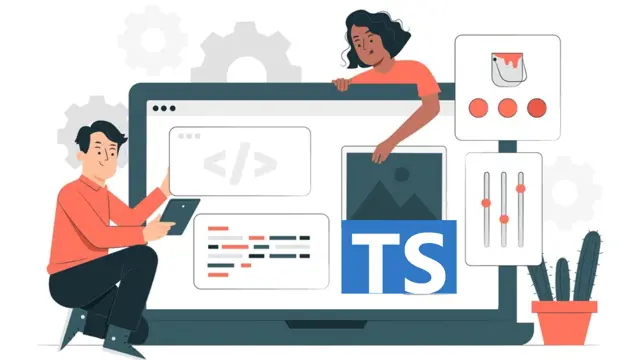- Reed Courses Certificate of Completion - Free
- Uplatz Certificate of Completion - Free

TypeScript: Next-Gen Web Development
Uplatz
Self-paced videos, Lifetime access, Study material, Certification prep, Technical support, Course Completion Certificate
Summary
Overview
Certificates
Reed Courses Certificate of Completion
Digital certificate - Included
Will be downloadable when all lectures have been completed.
Uplatz Certificate of Completion
Digital certificate - Included
Course Completion Certificate by Uplatz
Curriculum
Course media
Description
TypeScript - Course Syllabus
Module 1: Introduction to TypeScript
Introduction to TypeScript
- What is TypeScript?
- Why should we learn TypeScript?
- TypeScript vs JavaScript
Setting Up TypeScript Environment
- Installing TypeScript
- Writing your first TypeScript program
- Understanding the TypeScript project structure
- Configuring tsconfig.json
Module 2: TypeScript Basics
Basic TypeScript Syntax
- Primitive types (string, number, boolean, etc.)
- Explicit vs inferred types
Complex Types
- Arrays, Tuples, and Enums
- Union and Intersection types (with examples)
Advanced TypeScript Types
- Interfaces and Type Aliases
- Default values, unions, and intersections
Type Assertions, Function Types, and Generics
- Type assertions
- Function types
- Introduction to Generics
Module 3: Object-Oriented TypeScript
Working with Classes and Objects
- Creating classes and objects
- Access modifiers (public, private, protected)
- Readonly properties
Advanced Class Features
- Getters and setters
- Static properties and methods
- Abstract classes and inheritance
Object-Oriented Programming in TypeScript
- Implementing OOP principles
- Hands-on project
Module 4: TypeScript Modules and Integration
Understanding TypeScript Modules
- Organizing and using modules
- Importing and exporting
Integrating TypeScript with JavaScript Frameworks
- Using TypeScript with React and Node.js
Declaration Files and Frontend Tooling
- Using declaration files (.d.ts)
- Working with frontend tools like Webpack and Babel
Module 5: TypeScript Utilities and Features
Useful TypeScript Utilities
- Utility types (Partial, Readonly, Record, etc.)
- Best practices
Function Types and Overloading
- Function signatures
- Overloading functions
Deep Dive into TypeScript Classes and Inheritance
- Extending classes
- Using mixins
Exploring Access Modifiers and Readonly Properties
- Real-world examples
Module 6: Hands-on TypeScript Projects
Building a Modular Application
- Structuring a scalable TypeScript app
Building a Type-Safe Library
- Creating a library with strict typing
TypeScript with Angular
- Setting up an Angular project with TypeScript
Using TypeScript with Vue.js
- Developing a Vue.js project with TypeScript
Module 7: Error Handling, Debugging, and Compilation
Error Handling in TypeScript
- Catching and managing errors
- Debugging TypeScript code
Understanding TypeScript Compiler Options
- Exploring tsc options
Module 8: Advanced TypeScript Concepts
Working with TypeScript Mixins
- Creating reusable mixins
Building a Notification System using Mixins
- Hands-on project
Exploring TypeScript Decorators
- Class, method, and property decorators
Advanced Generics in TypeScript
- Conditional types and mapped types
Module 9: Full-Stack TypeScript Development
Building a REST API with TypeScript
- Setting up an Express.js backend with TypeScript
Creating Endpoints and Handling Requests
- CRUD operations
Setting Up a TypeScript Frontend Project
- Configuring a frontend app
State Management with TypeScript
- Using Vanilla TypeScript, Context API, and Redux
TypeScript Routing
- Handling navigation with React Router
API Integration with TypeScript
- Using Axios with TypeScript
Unit Testing in TypeScript
- Testing with Jest
Preparing for Production and Deployment
- Best practices for production-ready TypeScript apps
Module 10: TypeScript for Mobile Development
Why Use TypeScript with React Native?
- Benefits of TypeScript in mobile apps
Creating a React Native Project with TypeScript
- Step-by-step guide using Expo
Module 11: TypeScript Namespaces and Utility Projects
Understanding TypeScript Namespaces
- Organizing code with namespaces
Quote Generation Project with TypeScript
- Step-by-step project
Blog Post Manager Project
- CRUD operations in TypeScript
Blog Post Manager with SQLite
- Database integration
Building a Password Generator in TypeScript
- Node.js and React implementations
Module 12: Interview Preparation & Conclusion
- Common TypeScript Interview Questions
- Explanation with examples and tables
Who is this course for?
Everyone
Requirements
Passion and determination to achieve your goals!
Career path
- Frontend Developer
- Full Stack Developer
- JavaScript Developer
- TypeScript Developer
- React Developer
- Angular Developer
- Vue.js Developer
- Node.js Developer
- Web Developer
- Software Engineer
- UI/UX Engineer
- Mobile App Developer
- Backend Developer (Node.js with TypeScript)
- Technical Lead
- DevOps Engineer
- Game Developer
- Cloud Developer
- Open Source Contributor
- API Developer
- Enterprise Application Developer
Questions and answers
Currently there are no Q&As for this course. Be the first to ask a question.
Reviews
Currently there are no reviews for this course. Be the first to leave a review.
Legal information
This course is advertised on Reed.co.uk by the Course Provider, whose terms and conditions apply. Purchases are made directly from the Course Provider, and as such, content and materials are supplied by the Course Provider directly. Reed is acting as agent and not reseller in relation to this course. Reed's only responsibility is to facilitate your payment for the course. It is your responsibility to review and agree to the Course Provider's terms and conditions and satisfy yourself as to the suitability of the course you intend to purchase. Reed will not have any responsibility for the content of the course and/or associated materials.
FAQs
Interest free credit agreements provided by Zopa Bank Limited trading as DivideBuy are not regulated by the Financial Conduct Authority and do not fall under the jurisdiction of the Financial Ombudsman Service. Zopa Bank Limited trading as DivideBuy is authorised by the Prudential Regulation Authority and regulated by the Financial Conduct Authority and the Prudential Regulation Authority, and entered on the Financial Services Register (800542). Zopa Bank Limited (10627575) is incorporated in England & Wales and has its registered office at: 1st Floor, Cottons Centre, Tooley Street, London, SE1 2QG. VAT Number 281765280. DivideBuy's trading address is First Floor, Brunswick Court, Brunswick Street, Newcastle-under-Lyme, ST5 1HH. © Zopa Bank Limited 2026. All rights reserved.

